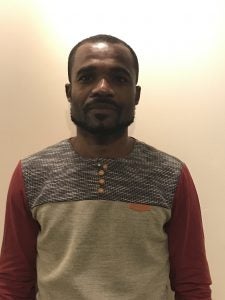 What is your professional background?
What is your professional background?
I am a medical doctor, specifically a resident surgeon. I am from Haiti, and I am currently working in Haiti. My goal is to become a surgeon, specifically a city surgeon. I came to the US in 2013 for my training in a New Mexico Hospital, where I spent two months working in cardiothoracic surgery, sports medicine, and microsurgery. Then, I came back to my country to complete my medical studies. After that, I had a chance to go to Providence Holy Family Hospital in Spokane doing the same thing. After that, I came back because I said, the US has a lot of doctors, Haiti needs good doctors as well.
What are some of the challenges you face in your daily work?
That’s why I am here today. I have been working mostly in villages, with people in poorer communities since after the earthquake. I used to work in Mirebalais, in the Central Plateau of Haiti. That’s the biggest hospital that we have in Haiti because of the kind of care that we offer to the people. We offer some free care, so people come from around Haiti and even from the Dominican Republic sometimes for care that they don’t find anywhere else.
My biggest challenge is to fight to get to my goal. Many people discouraged me along the way. They told me I couldn’t go it. Your family won’t be able to pay. Give up! But, I made it, I made it here. People along the way took concern for me.
Sometimes another challenge is I am distracted by my family situation, by taking are of my mother, sister, brother after the earthquake. The financial situation changed then.
We have many infections, diseases that people don’t know exactly what to do with. Consequently, they have to find someone to tell them what exactly it is, and then what you can do to avoid that illness.
Sometimes the problem is we have a bunch of people; some come just one week away from death, and they want to be seen. They spend a lot of time on the ground or on the yard waiting to be called by the nurse, hoping for any way they could see a doctor. But the challenge is sometimes we never have time to see those people. Many of them used to get sent home. They’ll come back again. But, sometimes we never have the chance to do every surgery that we have to do. We have too many patients and not enough doctors. It’s not only in surgery, but it’s also in internal medicine, everywhere.
What do you hope to accomplish?
My dream is to become a cardiac surgeon, to take the USMLE, study, and then get back to Haiti. We don’t have the opportunity there. A friend of mine died from a cardiac issue in Haiti. There are no cardiac surgeons there. I don’t like to see bad things that I can’t change.
When were you first introduced to UpToDate?
I started to use UpToDate in 2013. My first time using UpToDate I remember I was in the New Mexico Surgery Center. I was performing some work in orthopedics, and then one of my mentors said, “Junior, I have an UpToDate account, I think you will need it.” And then he just gave me access to his account. Since then I have been using UpToDate. In 2017, I received my own account because UpToDate offered a free account to all the residents.
What do you like about UpToDate, and how has it helped you in your daily challenges?
I have so many examples. I was at an internship, and I had a patient suffering from Loeys-Dietz Syndrome. I didn’t understand what it was the first time I saw it. Then, we worked together with other interns, and I just checked my UpToDate. Then I was able to tell the nurse exactly what the illness was and then I was able to talk with the patient and make him confident because, at this time he thought that everything was down for him, but when I looked up his condition in UpToDate I was able to explain that we could do something for him, and we’d try our best to help him.
UpToDate is very methodic. You can have the knowledge, but with UpToDate you’ll know how to proceed step by step, and you are able to explain what the pathology is exactly, how we can assess the patient, and how we can fix the issue. UpToDate uh methodology gave me methodology, knowledge, and many ways to assess. UpToDate offers an opportunity when you are in a poor country. You can still assess the patient and take care of the patient.
How will UpToDate continue to affect your career?
Sometimes you can see patients that say, “I don’t go to the hospital, I don’t want to go to the hospital. I don’t want to be treated by that doctor.” because the doctor is not confident, but with UpToDate, people can be confident and then the medical care can be what it has to be. That’s why I always say thank you to UpToDate, to the UpToDate team, because I think by spreading UpToDate, we are trying to put a standard on medical practice.


